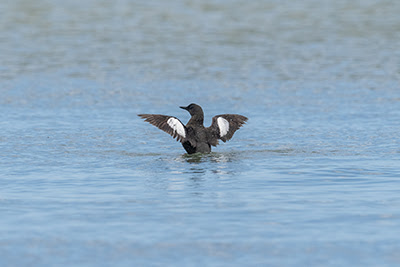It was a beautiful night with stars shining brightly above us and the sound of the waves lapping against the shore as the tide rose and forced the waders off the mud and onto our muddy pools.
We caught a good number of birds with the majority being Redshank but around 25% of the catch being Curlew with a smattering of Oystercatchers for good measure. Star bird however was this smart 2nd calendar year (Euring 5) Snipe that I extracted from a mist net and was allowed to ring myself as I'd never ringed one before!
Ageing proved to be relatively straight forward with the adult median coverts having a dark shaft extending right to the feather tip whilst the retained juvenile feathers had the dark shaft falling short of the feather tip. It was pretty subtle and difficult to see under the light of a head torch though!
A beautiful bird and very cryptically camouflaged. Well worth the effort of missing my tea and getting home at 01.30 am for.
Ageing the Curlew and Redshank are more straight forward and features wear on the tertials. WHite bits of feathers wear much faster than dark bits and the retained juvenile tertials of a number of species have a distinct saw edge where the feather has worn away. Although adults can show some wear its never as extreme as shown by juveniles. Juvenile feathers are older than those of adults who will not long have completed a post breeding moult. Juvenile feathers are generally poorer quality than adults as well.
Check out the juvenile tertials on the Curlew and Redshank below:
Another fantastic night but I was pretty shattered by the time I fell into bed. I pulled up on the drive to hear Robin, Blackbird & Wren singing at 01.30 am! I was up again at 07.00 and manged to get this photo of the partial solar eclipse from our back garden before leaving.





































































No comments :
Post a Comment